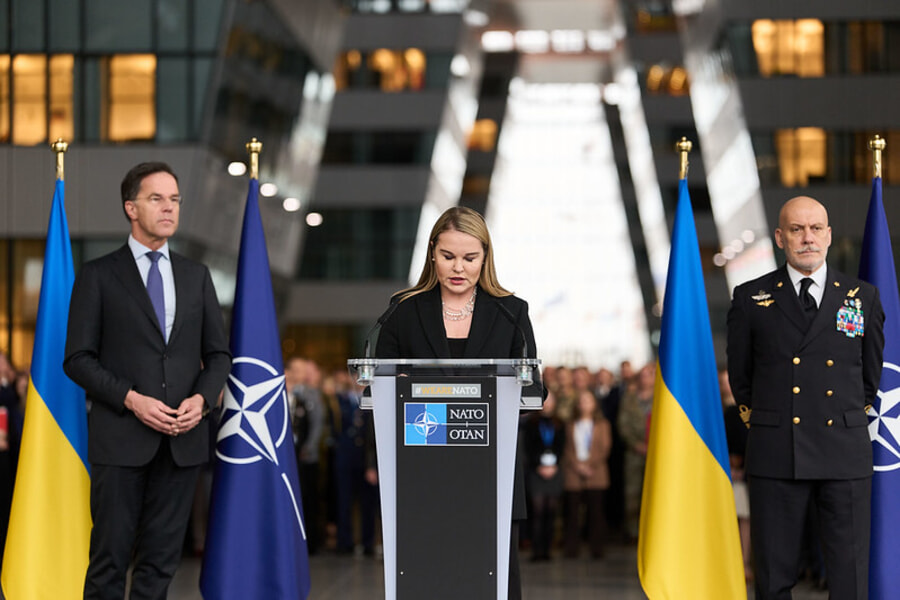Today's Headlines and Commentary
The New York Times reports that the deadliest chemical weapons attack in years in Syria killed dozens of people in the northern province of Idlib this morning. A few hours later, witnesses say that an airstrike hit a clinic where patients were being treated for the after effects of the chemical weapons attack.
The New York Times reports that the deadliest chemical weapons attack in years in Syria killed dozens of people in the northern province of Idlib this morning. A few hours later, witnesses say that an airstrike hit a clinic where patients were being treated for the after effects of the chemical weapons attack. The EU and Turkish President Recep Tayyip Erdogan condemned the attack and blamed the Syrian government, as did the White House, calling it “reprehensible,” and an act that “cannot be ignored by the civilized world.” France has called for an emergency meeting of the U.N. Security Council. CNN adds that the White House called the attack a “consequence,” of the Obama administration’s “weakness and irresolution.” But Senator John McCain (R-AZ), chairman of the Senate Armed Services Committee, laid the blame at the feet of the Trump administration, calling out Secretary of State Rex Tillerson and U.N. Ambassador Nikki Haley for their comments earlier this week saying Assad’s removal is not the administration’s priority in Syria.
The Washington Post informs us that the United Arab Emirates arranged a secret meeting in January between Erik Prince, the founder of the private military company Blackwater and brother to Education Secretary Betsy DeVos, and a Russian close to President Vladimir Putin as part of an apparent effort to establish a back-channel of communication between Moscow and then-President-elect Trump. The meeting took place on January 9—eleven days before Trump’s inauguration as president—in the Seychelles. Prince reportedly presented himself as an unofficial envoy for Trump to high-ranking Emiratis involved in setting up the meeting, who appear to have been seeking to gain the White House’s assistance in persuading Russia to curtail its support for Iran.
Writing in Bloomberg, Eli Lake reports that according to U.S. officials, former national security advisor Susan Rice may have requested unmasking of names of U.S. persons connected to the Trump transition and campaign in intelligence reports. As national security advisor, the ability to request unmasking of names from the intelligence agencies would have been within Rice’s purview. Rice denied in an interview with CNN that she had ever requested unmasking for political reasons. In a statement posted on Twitter, House Permanent Select Committee on Intelligence ranking member Rep. Adam Schiff (D-CA) announced that documents related to ostensible concerns over alleged improper incidental surveillance or unmasking of Trump transition team members will soon be made available to the full committee.
Carter Page, former campaign manager to President Donald Trump, met with and passed documents to a Russian intelligence operative in New York City in 2013, Buzzfeed tells us. Page met with Victor Podobnyy, who was later charged by the U.S. government, along with two others, for having acted as an unregistered agent of a foreign government. The revelation is the most clearly documented contact to date between Russian intelligence and someone in Trump’s orbit. Page rose to prominence within the Trump campaign last summer, before being cut loose after reports that federal investigators were probing his ties to Russian officials.
The Times writes that the perpetrator of the bombing of a subway in St. Petersburg yesterday has been identified as Akbarzhon Dzhalilov, a native of Kyrgyzstan who held a Russian passport. The death toll from the attack has reached 14, with more than 60 injured. Forensic experts found Dzhalilov’s DNA on a bag left over at the Vosstaniya Square metro station which had a more powerful bomb that was defused soon after the explosion on Monday. The genetic link, coupled with CCTV footage, led investigators to believe Dzhalilov blew himself up and wanted the other bomb to blow up afterwards. No group has claimed responsibility for the attack, and there is so far no evidence linking Dzhalilov to a terrorist organization.
National Security Adviser Lt. Gen. H.R. McMaster is continuing to fill out his national security staff with conservative foreign policy experts from the think-tank world, preferring them to the those with a military intelligence background like those tapped under former national security adviser Michael Flynn, according to the Post. Officials have confirmed that McMaster offered the post of senior director for South and Central Asia to Lisa Curtis, a well-known conservative expert and senior fellow at the Heritage Foundation. McMaster scuttled Flynn’s choice, Brig. Gen. Robin Fontes, who currently serves as the defense attaché at the U.S. embassy in New Delhi.
Reuters reports that Somali pirates have hijacked an Indian commercial vessel off the coast of Somalia, the second attack in weeks after years without such seizures. The vessel, named the Al Kausar, was en route from Dubai to the port of Bossaso in northern Somalia’s semi-autonomous Puntland region. The EU naval force that patrols off Somalia’s coast as part of an international anti-piracy operation said that investigations and operations are ongoing.
The Hill notes that the House approved legislation on Monday that would order the State Department to determine whether North Korea is a state sponsor of terrorism. The vote of 394-1 comes after numerous missile tests by the rogue state, and was cast in conjunction with a resolution condemning North Korea’s development of intercontinental ballistic missiles in violation of U.N. Security Council resolutions. The legislation comes as revelations surface that North Korean hackers may have secured access to portions of a secret war plan to be used in the event of a conflict on the Korean peninsula in a cyberattack last September, entitled OPLAN 5027. The plan, originally developed in 1978, is updated every 2 years and includes troop deployment plans, key North Korean targets, strategies, and military control of facilities in the North.
The Post writes that NSA Deputy Director Richard Ledgett revealed new details about the Russian hacking of the State Department in 2014, saying that it was “hand-to-hand” combat as U.S. cyber defenders engaged in a pitched battle over a 24-hour period with the Russian hackers. Whenever NSA hackers cut the attackers’ link between their command and control server and the malware, the Russians would simply set up a new one, which amounted to “a new level of interaction between a cyber attacker and a defender.” Fortunately, according to Ledgett, the NSA was able to spy on the attackers’ tools and tactics, to glean new information that could be used later.
Former CIA Director John Brennan told BBC Newsnight that Trump’s travel ban is “simplistic and misguided” and would be counterproductive if implemented, according to the Guardian. Brennan also commented that Trump’s use of the phrase “radical Islamic terrorism,” serves to legitimise terrorists like members of ISIS in their own eyes, and warned that the president’s disparagement of the intelligence community would hurt morale and recruitment.
The Times tells us that Trump’s son-in-law and senior White House adviser Jared Kushner arrived in Baghdad yesterday afternoon at the invitation of General Joseph Dunford, Jr., the chairman of the Joint Chiefs of Staff, and met with Iraqi Prime Minister Haider al Abadi. Kushner is also expected to meet with officials from the U.S.-led military coalition and Iraq’s minister of defense. He is accompanied by Trump’s homeland security adviser, Thomas Bossert. Kushner’s visit has been criticized as a break from normal government practice, while the White House also broke with protocol by confirming Kushner was in Iraq before he landed, something officials in the past have avoided for fear that the official in question would become a target. Politico adds that Kushner’s trip is part of a wider effort by the Pentagon to reach out to the White House by Defense Secretary James Mattis and Dunford, while the Post notes that Kushner has a “singular and almost untouchable role” in the White House, displacing at times both the Secretary of State and the national security adviser.
As Egyptian President Abdel Fatteh al-Sisi met with Trump yesterday, Trump heaped praise on the autocratic ruler, saying that the two “agree on so many things” and that the Egyptian president had done a “fantastic job in a very difficult situation,” the Times reports. Foreign Policy writes that the relationship between the two heads of state has a personal warmth to it, with a strong bond being forged over the common threat of terrorism. Sisi’s visit comes right before that of Jordanian King Abdullah II, who will have his second meeting with Trump following a meeting in February in which the two discussed the Israeli-Palestinian peace process and the safety of Syrian refugees.
On a lighter note, New York Magazine profiles Brace Belden, an American citizen from San Francisco who has become a foreign fighter for the Syrian YPG in its fight against the Islamic State and has gained a large following on Twitter.
Foreign Policy informs us that Russia blocked the appointment of former Clinton White House director of U.N. affairs Richard Wilcox as the U.N. Secretary-General’s special representative to Libya, saying in private that Wilcox did not have the necessary stature for a job previously held by senior foreign diplomats. The move comes at a time when Russia seeks to expand its own role in Libya’s future with its backing of the Libyan militia leader Khalifa Haftar.
The Times notes that the U.S. Supreme Court has granted certiorari in a case to decide whether corporations may be sued in American courts for complicity in human rights abuses abroad. The case concerns Arab Bank, which is based in Jordan and has been accused of processing financial transactions through a branch in New York for groups linked to terrorism, with the plaintiffs seeking to hold the banks liable for attacks in Israel and in the Palestinian territories by Hamas and other groups.
ICYMI: Yesterday, on Lawfare
Benjamin Wittes explained why being incidentally surveilled (as he was) is often a good thing.
Bobby Chesney provided an update on Myron Cramer’s 1945 memo on surveillance legal issues.
Ganesh Sitaraman examined the national security consequences of deregulation.
Michael O’Hanlon outlined how the United States can work with both the Kurds and Turkey in Syria.
David Kimball-Stanley considered the implications of the three separate opinions in the force-feeding video case brought by Abu Wa’el Dhiab in the U.S. Court of Appeals for the D.C. Circuit.
Jordan Brunner covered the final session of the week’s military commissions hearings in the 9/11 case.
Email the Roundup Team noteworthy law and security-related articles to include, and follow us on Twitter and Facebook for additional commentary on these issues. Sign up to receive Lawfare in your inbox. Visit our Events Calendar to learn about upcoming national security events, and check out relevant job openings on our Job Board.





